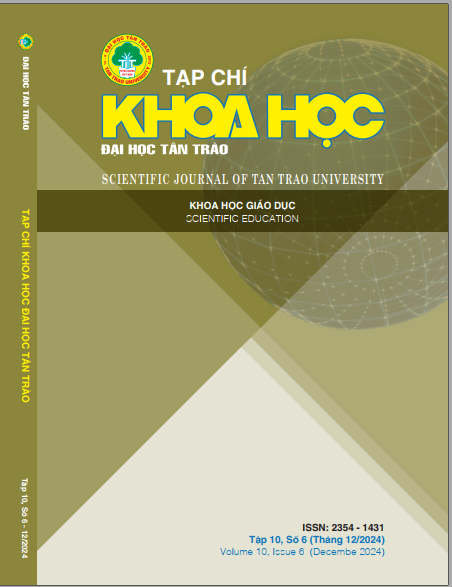CÁC YẾU TỐ ẢNH HƯỞNG ĐẾN VIỆC QUẢN LÝ HOẠT ĐỘNG TRẢI NGHIỆM TẠI TRƯỜNG TIỂU HỌC LOMONOXOP THEO CHƯƠNG TRÌNH GIÁO DỤC CHUNG NĂM 2018
DOI:
https://doi.org/10.51453/2354-1431/2024/1262Từ khóa:
Ảnh hưởng, Công tác quản lý, Hoạt động trải nghiệm, Chương trình, Giáo dục phổ thông 2018Tóm tắt
Nghiên cứu này nhằm xác định các yếu tố ảnh hưởng tới công tác quản lý hoạt động trải nghiệm ở trường tiểu học Lômônôxốp trong bối cảnh triển khai Chương trình giáo dục phổ thông 2018. Phương pháp nghiên cứu sử dụng kết hợp phương pháp định tính và định lượng để thu thập và phân tích dữ liệu.
Kết quả nghiên cứu cho thấy, các yếu tố chính ảnh hưởng tới công tác quản lý hoạt động trải nghiệm bao gồm:1. Nhận thức của các lược lượng GD trong và ngoài nhà trường, 2. Năng lực của cán bộ quản lý, 3. Năng lực của GV, 4. Tính tích cực của HS , 5. Sự phối hợp của các lực lượng GD, 6. Điều kiện cơ sở vật chất, tài chính. Tuy nhiên mức độ ảnh hưởng của các yếu tố là khác nhau.
Kết quả nghiên cứu có thể được sử dụng để xây dựng các giải pháp nâng cao chất lượng quản lý hoạt động trải nghiệm ở trường tiểu học Lômônôxốp, đồng thời cung cấp bài học kinh nghiệm cho các trường tiểu học khác khi triển khai Chương trình giáo dục phổ thông 2018.
Tải xuống
Tài liệu tham khảo
Le Kim Anh (2022), Managing experiential activities and career guidance in junior high schools in Hanoi City according to the competency approach. Doctoral thesis, Hanoi National University.
Minister of Education and Training (2018), General education program on experiential activities and experiential activities and career guidance (Issued with Circular No. 32/2018/TT-BGIÒO DỰCĐT dated December 26, 2018 of the Minister of Education and Training).
Minister of Education and Training (2018), Issuing the general education program according to Circular No. 32/2018/TT-BGIÒO DỰCĐT dated December 26, 2018 of the Minister of Education and Training.
Ngo Xuan Hieu (2023), Some theoretical issues on managing experiential activities and career guidance for high school students to meet the 2018 General Education Program. Journal of Science, Hanoi Capital University, 68, 118-126.
Le Van Hung (2022), "Evaluation of management work at primary schools in Ho Chi Minh City", Journal of Education
Pham Minh Thao (2021), Managing EXPERIENTIAL ACTIVITIES is mentioned in the direction of coordinating educational forces inside and outside the School. Doctoral thesis.
Le Thi Hoai Thuong (2023), Managing the organization of experiential activities and career guidance towards developing students' qualities and abilities in high schools in Hanoi City. Doctoral thesis.
Tran Thi Mai (2021), "Survey on management of experiential activities in 30 primary schools in Hanoi", Education Magazine.
Kolb, D. A. (1984). Experiential Learning: Experience as the Source of Learning and Development. Englewood Cliffs, NJ: Prentice Hall.
Dewey, J. (1938). Experience and Education. New York: Macmillan.
Gardner, H. (1993). Multiple Intelligences: The Theory in Practice. New York: Basic Books.
Smith, A. B., & Jones, M. R. (2018). The Role of Management Competencies in Successful Experiential Learning Activities: A Study of 50 Primary Schools in Australia. Journal of Educational Management, 35(4), 278-295.
Anderson, M. K. (2019). Key Factors Influencing Management of Experiential Learning Activities: A Survey of 200 Primary School Teachers in Finland. Nordic Journal of Education Research, 42(3), 156-171.
Tải xuống
Đã Xuất bản
Cách trích dẫn
Số
Chuyên mục
Giấy phép

Tác phẩm này được cấp phép theo Giấy phép Quốc tế Creative Commons Attribution-ShareAlike 4.0 .
Bài báo được xuất bản ở Tạp chí Khoa học Đại học Tân Trào được cấp phép theo giấy phép Ghi công - Chia sẻ tương tự 4.0 Quốc tế (CC BY-SA). Theo đó, các tác giả khác có thể sao chép, chuyển đổi hay phân phối lại các bài báo này với mục đích hợp pháp trên mọi phương tiện, với điều kiện họ trích dẫn tác giả, Tạp chí Khoa học Đại học Tân Trào và đường link đến bản quyền; nêu rõ các thay đổi đã thực hiện và các nghiên cứu đăng lại được tiến hành theo cùng một bản quyền.
Bản quyền bài báo thuộc về các tác giả, không hạn chế số lượng. Tạp chí Khoa học Tân Trào được cấp giấy phép không độc quyền để xuất bản bài báo với tư cách nhà xuất bản nguồn, kèm theo quyền thương mại để in các bài báo cung cấp cho các thư viện và cá nhân.
Mặc dù các điều khoản của giấy phép CC BY-SA không dành cho các tác giả (với tư cách là người giữ bản quyền của bài báo, họ không bị hạn chế về quyền hạn), khi gửi bài tới Tạp chí Khoa học Đại học Tân Trào, tác giả cần đáp ứng quyền của độc giả, và cần cấp quyền cho bên thứ 3 sử dụng bài báo của họ trong phạm vi của giấy phép.






